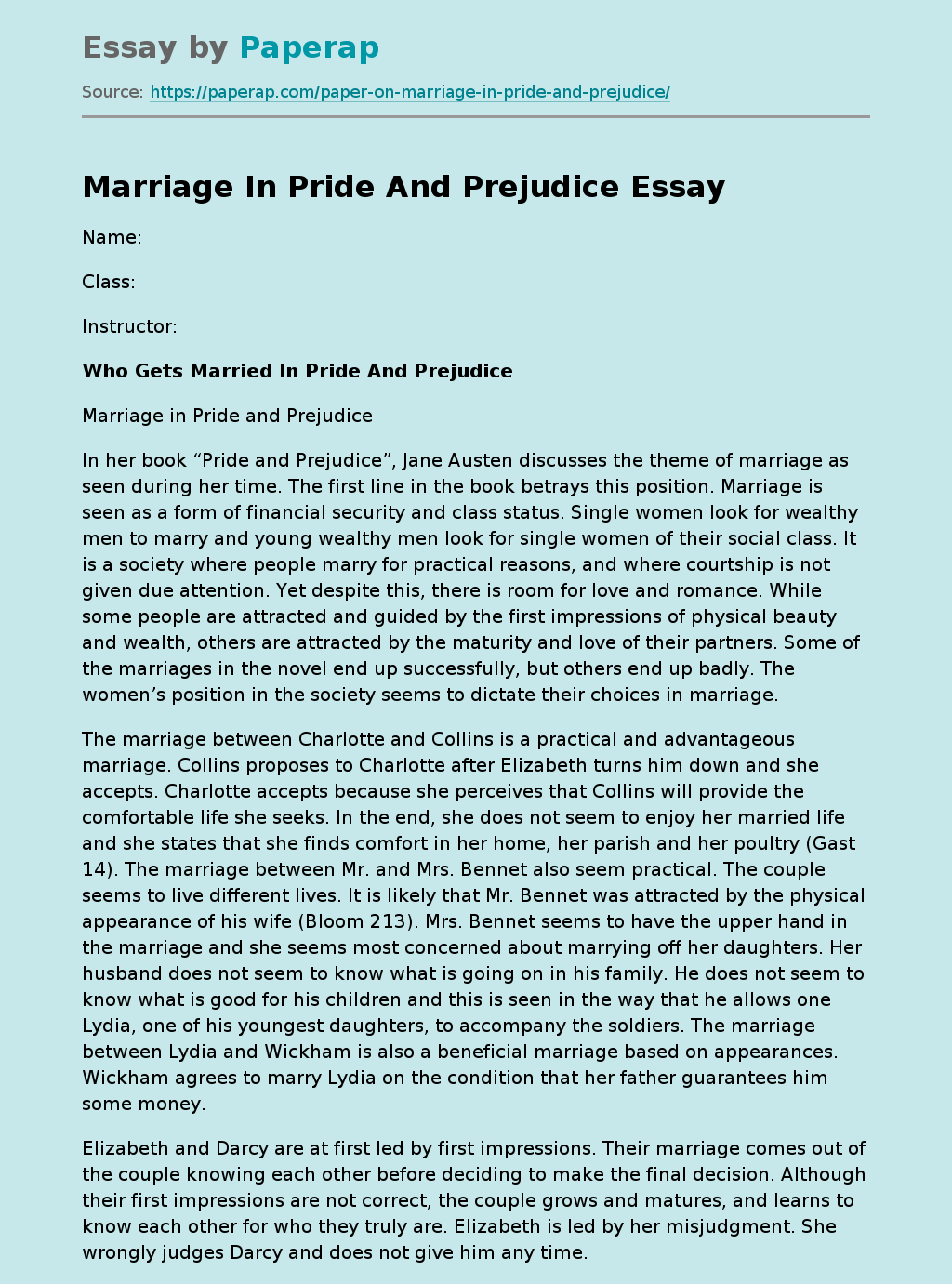Marriage In Pride And Prejudice
In the following example, the essay talks about marriage in pride and prejudice. Read the introduction, body and conclusion of the essay, scroll down.
Marriage in Pride and Prejudice
In her book “Pride and Prejudice”, Jane Austen discusses the theme of marriage as seen during her time. The first line in the book betrays this position. Marriage is seen as a form of financial security and class status. Single women look for wealthy men to marry and young wealthy men look for single women of their social class.
It is a society where people marry for practical reasons, and where courtship is not given due attention. Yet despite this, there is room for love and romance. While some people are attracted and guided by the first impressions of physical beauty and wealth, others are attracted by the maturity and love of their partners. Some of the marriages in the novel end up successfully, but others end up badly. The women’s position in the society seems to dictate their choices in marriage.
The marriage between Charlotte and Collins is a practical and advantageous marriage. Collins proposes to Charlotte after Elizabeth turns him down and she accepts. Charlotte accepts because she perceives that Collins will provide the comfortable life she seeks. In the end, she does not seem to enjoy her married life and she states that she finds comfort in her home, her parish and her poultry (Gast 14). The marriage between Mr. and Mrs. Bennet also seem practical. The couple seems to live different lives.
It is likely that Mr. Bennet was attracted by the physical appearance of his wife (Bloom 213). Mrs. Bennet seems to have the upper hand in the marriage and she seems most concerned about marrying off her daughters. Her husband does not seem to know what is going on in his family. He does not seem to know what is good for his children and this is seen in the way that he allows one Lydia, one of his youngest daughters, to accompany the soldiers. The marriage between Lydia and Wickham is also a beneficial marriage based on appearances. Wickham agrees to marry Lydia on the condition that her father guarantees him some money.
Elizabeth and Darcy are at first led by first impressions. Their marriage comes out of the couple knowing each other before deciding to make the final decision. Although their first impressions are not correct, the couple grows and matures, and learns to know each other for who they truly are. Elizabeth is led by her misjudgment. She wrongly judges Darcy and does not give him any time. On the other hand, Darcy judges Elizabeth based on her status in the society. He also disregards her at first and even refuses to dance with her. Another successful marriage is between Mr. and Mrs. Gardiner. They act as the voice of reason and responsibility in the novel. Although they seem concerned about social status, they do not have a rigid opinion on the issue. They seem affectionate and happy with each other (Gast 14). They advice Elizabeth concerning Wickham and they even search for Lydia and Wickham when they elope. Bingley takes his time before proposing to Jane. He does not do so out of pressure from anyone and the couple seems to be in love.
The society seems to have placed marriage above everything else (Moore). Mrs. Bennet does not seem to care the kind of life that her daughter will lead. She even encourages her husband to come home and stop searching for her daughter. She is overjoyed that her daughter is married even though she is married to a person the family barely knows. She is also overjoyed when she learns of her daughter’s engagement to Darcy despite the fact that she has never liked him. She especially seems excited that Darcy is wealthy and will provide for her daughter (Schmidt 6). Charlotte agrees to get married to Collins for practical reasons. She does not want to remain single and she wants the society to consider her a married woman despite the fact that she does not love her husband. Lady Catherine tries to break the impending marriage between Elizabeth and Darcy because of Bennet’s low status in the society. She does not respect the idea of love and marriage and she tries to convince Elizabeth to refuse any engagement.
The book portrays that marriage was about what one could receive from the partner rather than what one would give. The giving and receiving was based on wealth and status rather than love and affection. The parents in the book want their girls to get married to men who could offer them a good and comfortable life in terms of wealth and status instead of focusing on whether the men loved their girls or not. In general, the men who were wealthy and holding prestigious positions in the society had greater chances of marrying the girls they wanted as compared to the low class men or the poor men. Except for a few brave girls like Elizabeth who married whom they wanted to marry, most girls had no say in the kind of man they wanted to marry. They were only lucky if they fell in love in the process. Parents had the final word.
Works Cited:
- Bloom, Harold. Jane Austen’s Pride and Prejudice. New York, NY: Infobase Publishing, 2007. Print
- Gast, Nicole. Marriages and the Alternatives in Jane Austen ?s ‘Pride and Prejudice’. Germany: GRIN Verlag, 2007. Print
- Moore, Andrew. Jane Austen’s Pride and Prejudice – study guide. 2002. Web. 8 Nov 2011
- Schmidt, Katrin. The Role of Marriage in Jane Austen’s ‘Pride and Prejudice’. Germany: GRIN Verlag, 2008. Print
Marriage In Pride And Prejudice. (2019, Dec 05). Retrieved from https://paperap.com/paper-on-marriage-in-pride-and-prejudice/

